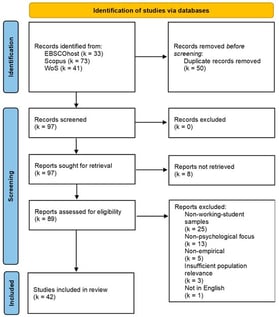- Review
The Psychology of Working Students: A Scoping Review
- Gaetana di Biase and
- Davide Giusino
Student employment is an increasingly common feature of higher education, yet psychological research on students who combine paid work and study remains conceptually and methodologically fragmented. This scoping review mapped the extent, range, and nature of empirical evidence on working students’ psychological experiences, summarized key psychosocial correlates, and identified gaps for future research. Consistent with PRISMA-ScR guidance, we searched EBSCOhost, Scopus, and Web of Science using tailored Boolean title-field strategies without year limits, screened records against eligibility criteria, and charted and thematically synthesized extracted data. Forty-two peer-reviewed English-language studies were included. Evidence clustered into six recurrent domains, such as work–study interface processes, resources and supports, health, stress and recovery, academic engagement and performance, career development and employability, and identity and social relations. The literature was predominantly quantitative and cross-sectional, with comparatively few intervention studies. Findings suggest that psychological outcomes are frequently examined through, and may be more closely contingent on, the quality of the work–study interface and contextual supports than on employment intensity alone, highlighting the potential value of interventions and institutional/employer practices that enhance role fit, flexibility, and supportive climates, alongside more longitudinal and multi-level research.
6 February 2026



